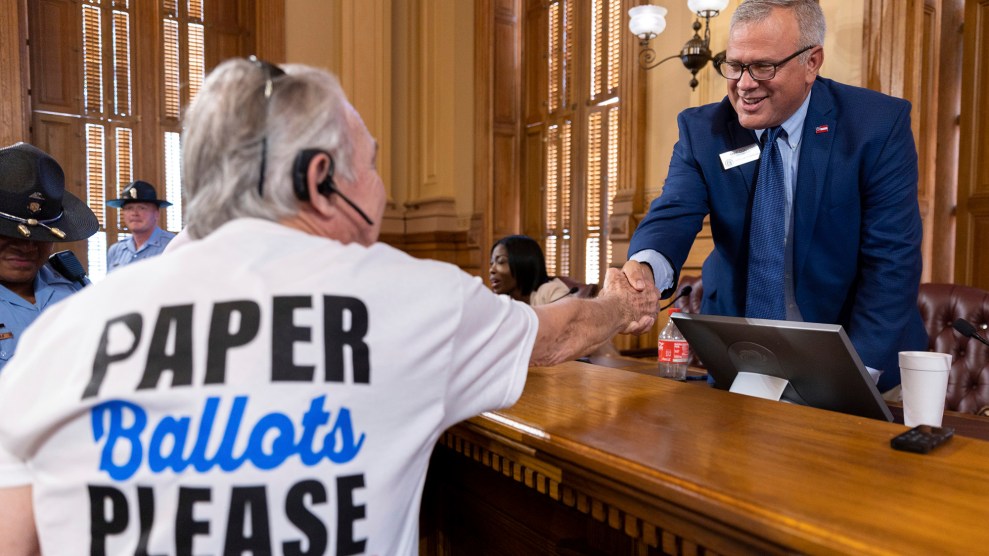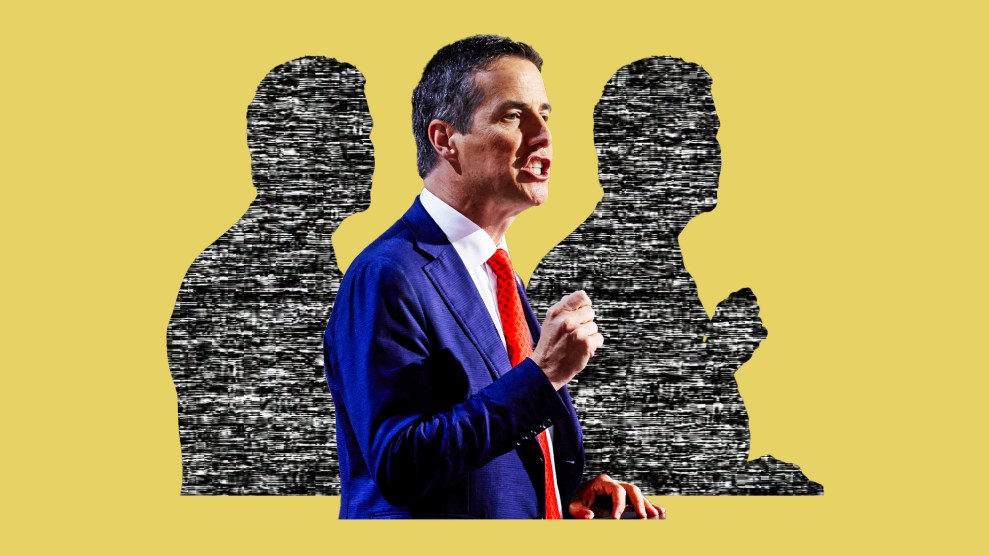Mother Jones: In figuring the logistics of a withdrawal from Iraq, there is the issue of refugees. What are the specific plans regarding refugees?
Kristele Younes: We’ve been asking the State Department what kind of contingency plan, if any, they’re looking at, not just for refugees but also for all the people who are displaced inside Iraq. What we’re getting are very vague answers. The State Department apparently has been looking at contingency planning since 2006, at what’s going to be happening in the region depending on several scenarios and how they would try to sort of tailor their response to those scenarios. But as far as I understand it, those plans are not public. They refuse to discuss them.
There seems to be sort of a gap in terms of forward planning. People are trying to convince themselves that the surge is going to work and that everybody will be returning to Iraq. But even if security does improve, it will take a very, very, very long time for people to return. When you have a crisis of this magnitude, people don’t return in a couple of days. It takes sometimes a generation for people to go home, even if it’s really safe. So there is a lot of concern over the fact that we’re not seeing much planning.
MJ: Do you think security issues will displace more Iraqis?
KY: I think it’s concerning. We’ve heard some Republicans say, “If we withdraw, there will be a huge refugee crisis.” Well, the reality is that there already is a huge refugee crisis. And yes, maybe it will get worse, maybe it won’t. It’s very difficult and I’m not a political analyst; I have no idea if the withdrawal will help or not the security situation. What I do know is that when I was in the region and when I was in country, a lot of people from minorities, a lot of Sunnis, a lot of Christians, were basically very concerned about a possible U.S. withdrawal, basically saying that if the U.S. fully withdraws what we will be seeing is much-increased ethnic cleansing. They’re very concerned for the survival of their communities.
MJ: Does Refugees International have a contingency plan?
KY: We don’t have operations on the ground. We’re purely an advocacy organization. I believe my colleagues who are actually operating in Iraq and elsewhere are considering this very much and trying to plan for the future. But again, it’s very difficult for them to really have any sort of solid basis for this kind of planning because there’s no information out there.
Another thing a lot of people are worried about is whether a withdrawal will encourage even more [internal displacement] camps inside Iraq. I don’t know if you were aware of that, but basically in the past few months there’s been an increase in the number of internal displaced camps inside Iraq because people have nowhere left to go inside the country. A lot of governors have closed their internal borders. A big concern is that we’ll be seeing more of that, and if the U.S. withdraws, then who is going to be protecting these civilians?
MJ: If the withdrawal increases violence and decreases the amount of security in the country, who’s going to be dealing with the day-to-day actual processing of refugees?
KY: I think the problem is going to be if the refugee crisis reaches a point where countries in the region feel that their own stability is threatened and they feel that they have reason to believe that the Iraqis on their soil are harmful. Basically, I think the question is going to be how much power the U.N. will have to stop any sort of mass deportation to Iraq and things like that. And the answer is, very little. If Jordan and Syria decide that they want to massively deport people back to Iraq, there’s nothing anyone will be able to do about it. And the only way to avoid that would be to provide Jordan and Syria with the assistance and support they need to be able to continue hosting these Iraqis.
MJ: And you think it’s unlikely that support will be given?
KY: I’m hopeful that it will, but for the moment what we are seeing is yes, increased support to the U.N., but the U.N. cannot do this on their own. What we need to see is much more bilateral assistance given to Jordan and Syria. Any sort of significant, comprehensive response to the crisis has to go through the central government, through the different ministries, to these institutions. The U.N. cannot respond to a crisis where you have 1.5 million people in a city when the water system is drained, when the education system is drained, and the health care system, etc. For now, in terms of bilateral assistance for Iraqis, the numbers are abysmal.
MJ: How large a role does “material support” play in all of this?
KY: It’s going to be a problem, mostly in terms of resettlement. Having provided material support to a terrorist organization is classified as an impediment to being resettled here. But many Iraqis have had to pay ransoms or bribes to save family members or themselves from certain death. We need to see legislation passed by Congress waving this exclusion if the support was provided under duress.
MJ: Secretary Rice has waved the material support rule for other groups. Could this happen here too?
KY: Sadly, I think we really need to see Congress pushing the administration on this. If Congress doesn’t impose standards that it will then be able to follow up on, I’m concerned that the administration will not take this seriously and I’m concerned we’re going to have to wait for the next administration to really take this issue on.
MJ: What is the main barrier to taking this seriously?
KY: The first is acknowledging the magnitude of the humanitarian crisis. It comes down to acknowledging the fact that the war in Iraq has obviously not gone the way people wanted it to go. It also comes down to acknowledging the fact that this will have consequences not only for Iraqis, for millions of them, but also for the entire region. I think there certainly is a blame game that is being played right now, where some people who were opposed to the war are now blaming the entire situation on others. That is not something we want to get into. Certainly the humanitarian community doesn’t. But at the same time, the U.S. has to show leadership in responding to the humanitarian issues. If we don’t see this leadership coming from the U.S., other members of the international community are not going to follow.
















